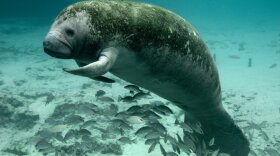
Steve Newborn
Steve Newborn is WUSF's assistant news director as well as a reporter and producer at WUSF covering environmental issues and politics in the Tampa Bay area.
He’s been with WUSF since 2001, and has covered events such as President George W. Bush’s speech in Sarasota as the Sept. 11 attacks unfolded; the ongoing drama over whether the feeding tube should be removed from Terri Schiavo; the arrest and terrorism trial of USF professor Sami Al-Arian; how the BP Deepwater Horizon spill affected Florida; and he followed the Florida Wildlife Corridor Expedition through the state - twice.
Before joining WUSF, he covered environmental and Polk County news for the Tampa Tribune and worked for NASA at the Kennedy Space Center during the early days of the space shuttle.
-
Workers were able to collect about 10,000 gallons of the sewage and return it to the main collection line. That left about 6,000 gallons flowing into wetlands owned by the university.
-
Brightline is working with Tampa officials to determine where a terminal should be located, along with the best route. It would likely come through Ybor City, close to I-4.
-
The plan would permanently close four gypsum stacks formerly used to store toxic wastewater from the production of fertilizer.
-
Backers say it would eliminate the need for the state government to enact any more preemption bills. This bill could cost local governments more than $900 million annually.
-
Charlotte County has voted to ban phosphate mining or any activities related to mining. This comes after plans were unveiled to dig a new mine in a neighboring county.
-
Her "Clean Water Initiative" would require state officials to adopt "best management practices" for the use of fertilizers and pesticides on farms.
-
The year that was 2021 wasn't a bad year for environmental initiatives in Tallahassee. More money could be forthcoming this year from Tallahassee, but some worry even that won't be enough.
-
Said one attorney: “It is painfully clear that Florida isn’t doing what’s necessary to control the sewage and fertilizer pollution that’s wrecking the Indian River Lagoon."
-
Environmental officials say that is the best solution to getting rid of the water as critics say they are downplaying the threat of underground contamination.
-
State environmental regulators ruled the proposed well could impact water supplies and endangered species, such as the Florida panther.











